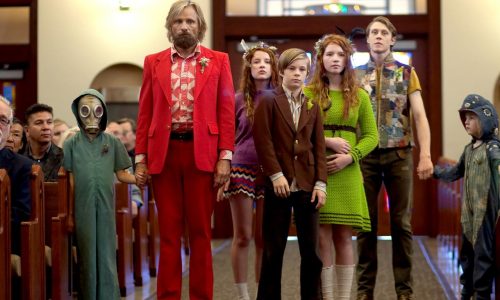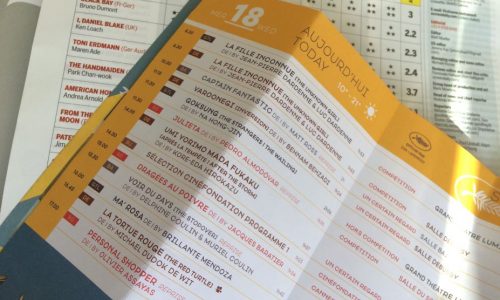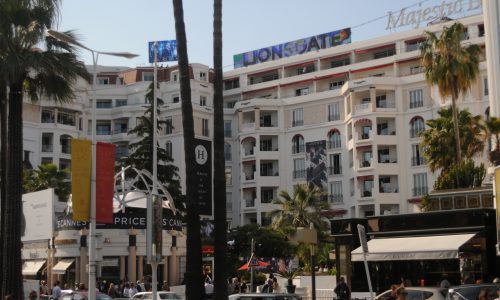After one too many repetitions of late nights out, followed by even later nights writing and then early mornings at screenings, today, I treated myself to a lie-in. Skipping the first film of the day, The Unknown Girl by Belgium’s Dardenne brothers, I headed down to the Croisette in time to catch one of the Un Certain Regard titles, Captain Fantastic. Whenever I had mentioned the film was on my radar, there had been someone who remarked – seriously – “Is that a superhero movie?”

Far from it. Captain Fantastic stars Viggo Mortensen as Ben, an ultra-libertarian, fundamentalist leftist Chomskyist atheist anarchist – or something along those lines – who’s bringing up his six children alone in the deep, dark wood. But when a family tragedy strikes, he’s forced to bring them back into mainstream life – it’s powerful, thought-provoking, heart-warming – and most importantly, genuine.
You don’t have to share all of – or any of – his beliefs or philosophies to identify with the situations – but you’ll have to share his passion for life and the welfare of his children. It explores familiar themes, such as the clash between theoretical knowledge and putting it into practice, but with refreshing flair. Mortensen is thoroughly convincing and has strong support from Frank Langella, Katherine Hahn and George Mackay leading an impressive array of child actors. To have a film that can be intellectually challenging as much as it can open your mind, tug on the heart-strings and elicit tears is sadly unusual. There are moments – not least the final act – which raise more questions than they answer or feel a little arch, but it was certainly one of those rare films that makes you feel better about being alive.

As well as tiredness playing havoc with my enjoyment of many of the films, it’s also left me behind with my writing, so with a gap between screenings and no seminars or meetings to dash to, I had an opportunity to catch up with some work. Needing both a power socket and wifi, I was lucky to find that you can pick up the UK Film Centre’s internet connection from the EU Media pavilion two doors down, where many of the tables have access to plug-holes.
The next film of the day was Personal Shopper, by Frenchman Olivier Assayas – no stranger to Cannes, after screening both his epic Carlos the Jackal biopic and the more recent Clouds of Sils Maria here. The latter starred Kristen Stewart, who returns in a not dissimilar role. This time, she’s – as the title might suggest – a personal shopper to a wealthy fashionista in Paris. But that is about as far as you might be able to work out from the title, which doesn’t mention that she is a medium and for much of the film, she’s trying to make contact with her late brother, who was also a medium, and promised to contact her if he died first. Then there’s a murder mystery (which is solved the scene after the body is found), a mystery texter (could it be her brother, we’re meant to wonder, I presume), which is unresolved. There are elements worthy of watching – not least Kristen Stewart’s somewhat tortured central performance, but with the lead actors being American, French and German, with elements of the supernatural, thriller and drama, it’s almost as if Olivier Assayas was cynically trying to appeal to absolutely anyone who ever goes to the cinema anywhere and will probably end up up attracting no-one who ever goes to the cinema anywhere. A sign of how successful or otherwise a film might be is how it goes down at the official screenings. Robert De Niro received a 15 minute standing ovation at the screening of Hands of Stone, for example. Kristen Stewart’s was only 4 minutes – and there were reports of booing and a large number of walkouts from the 2000-seater Lumiere cinema during its premiere.

This evening’s entertainment was, once again, provided by the festival’s sponsor HP, which staged a reception at the Majestic Hotel to promote the work is has done for civil rights in developing countries. Arriving halfway through the speeches, it wasn’t quite clear how its computers might have helped the women of India, but the passion with which speakers spoke of its Girl Rising programme was accompanied by a plea to think about making films that can make a change.
As you might have noticed, today seemed decidedly more empty than yesterday and tomorrow is looking to be even more thin, signalling that while the festival rolls on until the Palme d’Or is handed on Sunday night, the market winds up much sooner. Some stands had already been packed up by Tuesday evening. Some market participants stick around to catch up on festival films that they’ve missed, but with fewer people around, there are fewer events being laid on. But on the positive side, it does tend to mean that queues for films are shorter and there’s less of the Cannes problem of waiting for over an hour for a film and being the last one not to get in.
